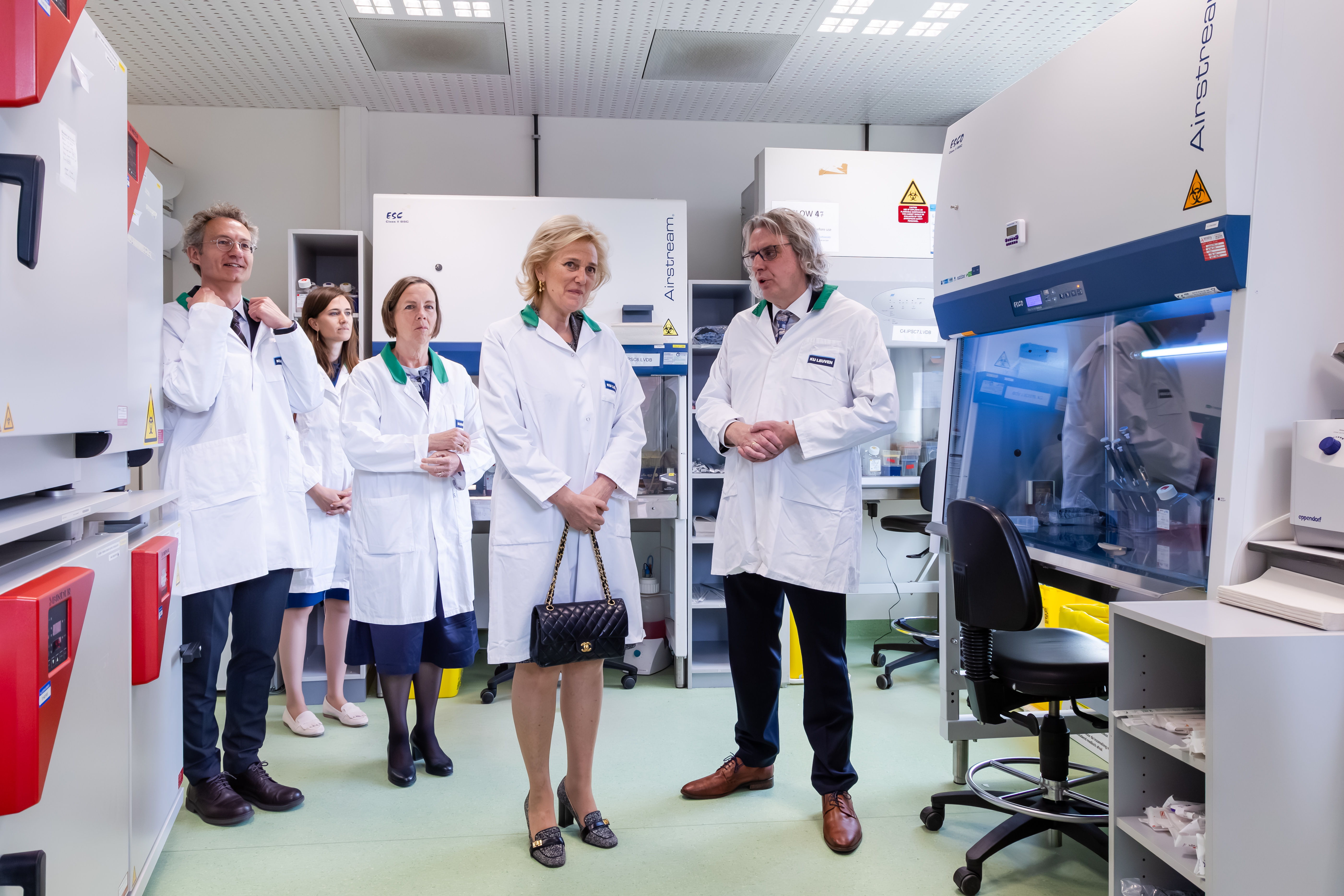
Princess Astrid visits the VIB-KU Leuven Center for Brain & Disease Research
Leuven, 22 April 2024 - On Monday, 22nd April, Princess Astrid visited the lab of Prof. Ludo Van Den Bosch and Prof. Philip Van Damme at the VIB-KU Leuven Center for Brain & Disease Research. In 2023, Ludo was awarded the Generet Prize for his research on Amyotrophic Lateral Sclerosis (ALS). This prize, managed by the King Baudouin Foundation, carries a grant of 1 million euros, making it the most prestigious award for rare disease research in Belgium and Europe.
Amyotrophic lateral sclerosis (ALS) is a neurodegenerative disease affecting the nerve cells that make movement possible. The condition selectively affects motor neurons, the cells that communicate with the muscles. As a result, people with ALS gradually lose control of their muscles until they are completely paralyzed and unable to speak and breathe. The disease is incurable, and patients usually die within two to five years of diagnosis. In Belgium today, about 1,000 people are suffering from this disease and 100 to 250 new diagnoses are made every year.
Ludo Van Den Bosch and Philip Van Damme have been studying the underlying mechanisms of this neurodegenerative disease for many years at the Laboratory for Neurobiology. The research is carried out in close collaboration with the Neurology department of the University Hospital Gasthuisberg in Leuven, and with the ALS League, a Belgian association of ALS patients. They work intensively with national and international research groups and are part of the Leuven Network to Cure ALS (LEUCALS), the European Network to Cure ALS (ENCALS), Project MinE, and the Robert Packard Center for ALS Research in the United States.

Generet Prize
The Generet Fund, managed by the King Baudouin Foundation, aims to establish a globally recognized research hub for rare diseases in Belgium. It annually awards a 1-million-euro prize to a top researcher in Belgium conducting research on rare diseases. The jury of independent experts praised Van Den Bosch's ambition to improve patients’ lives with ALS through his research.
Ludo Van Den Bosch and his team of researchers have previously discovered that, in ALS patients, transport along the processes that connect the cell body in the spinal cord to the muscles is disrupted. These processes can be more than a meter long, and normal transport in these processes is critical for the normal functioning of the motor system:
“We discovered that we can restore disrupted transport by selectively inhibiting a certain enzyme, HDAC6,” Prof. Van Den Bosch says. “In addition, inhibiting HDAC6 also has beneficial effects on the expansion of motor neuron processes and the formation of neuromuscular junctions, the connections between the motor neuron processes and the muscles.”
Ludo Van Den Bosch and his team are using the financial support associated with the Generet Prize to continue researching the positive effects of HDAC6 inhibition on motor neurons. In doing so, they will examine which mechanisms are responsible for these beneficial effects and will determine which proteins HDAC6 influences and how the inhibition of this enzyme induces this effect.

Distinguished visitor
In a crowning moment, Prof. Van Den Bosch, Prof. Van Damme, and their research team welcomed Princess Astrid to the VIB-KU Leuven Center for Brain & Disease Research. The princess engaged in discussions with the center's researchers and received a personal tour of the lab of Prof. Van Den Bosch and Prof. Van Damme. In the end, the Princess had the opportunity to meet ALS patients and their families.
Prof. Van Den Bosch expressed gratitude for the visit, stating:
"Princess Astrid's visit and her keen interest in our research are deeply appreciated, serving as a meaningful acknowledgment for our entire team and providing additional motivation for those diligently working to comprehend this devastating disease on a daily basis. The generous support from the Generet Fund has allowed us to greatly broaden our research efforts, bringing us closer to a potential breakthrough."
Levers for diagnosis and therapy
The additional resources Prof. Ludo Van Den Bosch received for his research are crucial to intensify the fight against this condition.
“The ultimate goal of this scientific research is to translate these new insights into the action of HDAC6 inhibition into a new therapeutic strategy that can be tested in ALS patients,” says Ludo Van Den Bosch. “We hope to make an important contribution towards finding a cure for this rare and fatal neurodegenerative disease.”
Moreover, the recent success of Toferson as a new therapeutic strategy for ALS proves that it is possible to make a difference for this dreadful disease.
“This clinical success, which was also based on a clinical trial performed in Leuven, gives hope to ALS patients that the disease can be stabilized,” says Prof. Philip Van Damme.

India Jane Wise
Joran Lauwers
About the VIB-KU Leuven Center for Brain & Disease Research
Scientists at the VIB-KU Leuven Center for Brain & Disease study how brain cells are organized and how they communicate with each other. These mechanisms reveal and provide insights into what goes wrong in brain diseases such as Alzheimer's, Parkinson's, ALS, and dystonia. This basic work should ultimately lead to new drugs for use against these currently incurable diseases.


